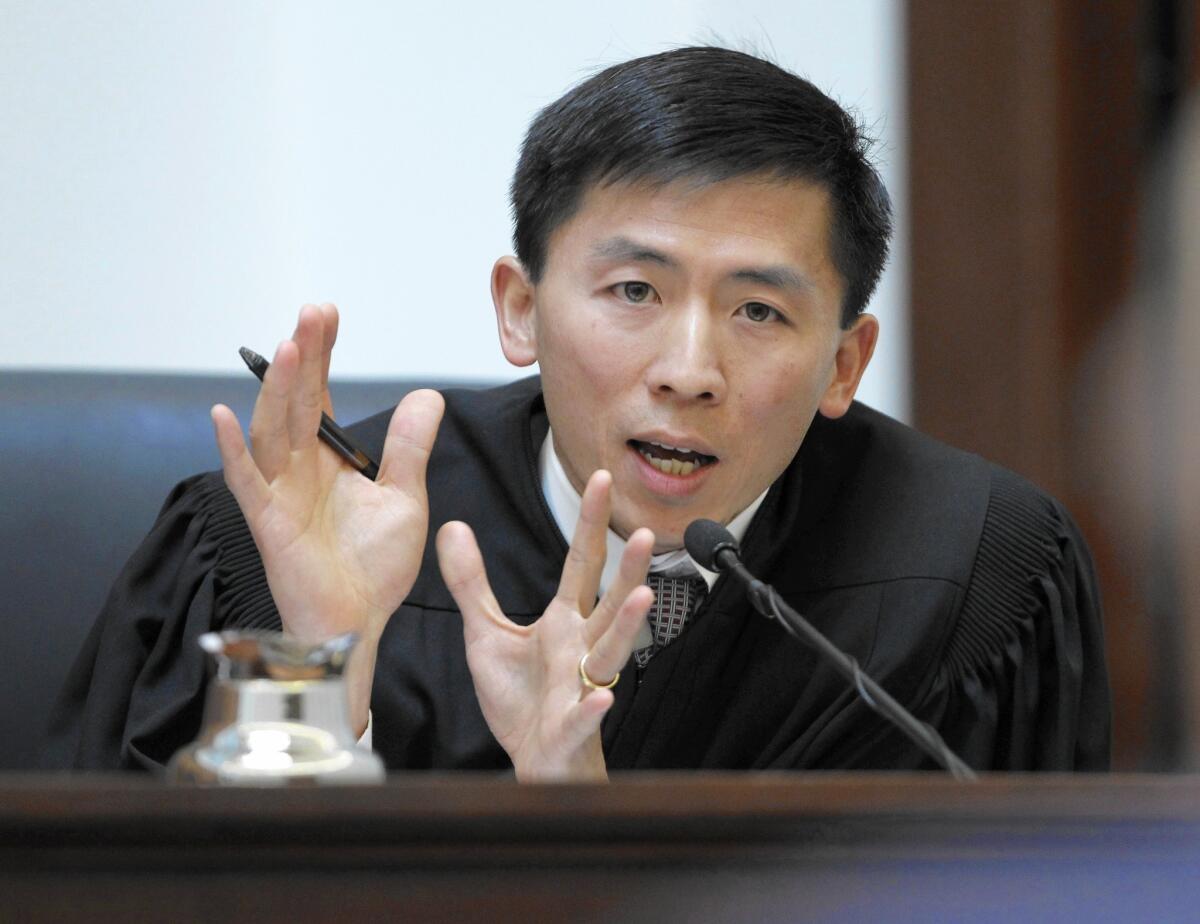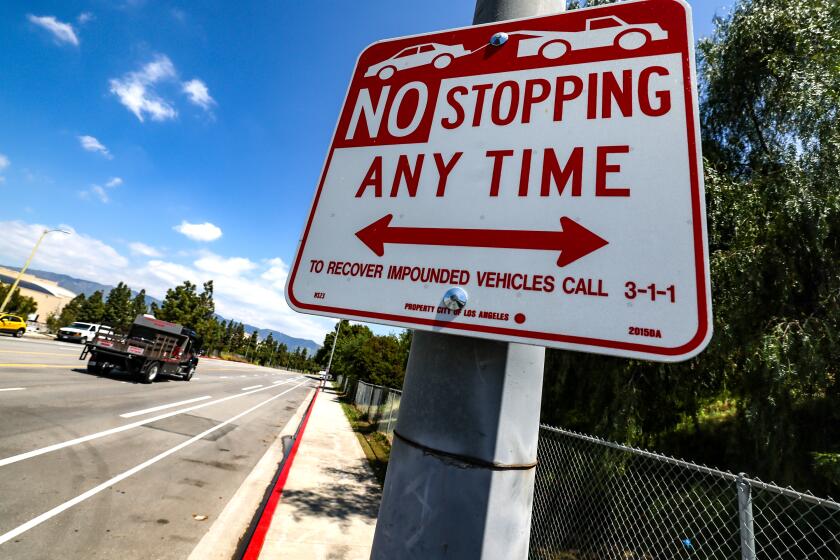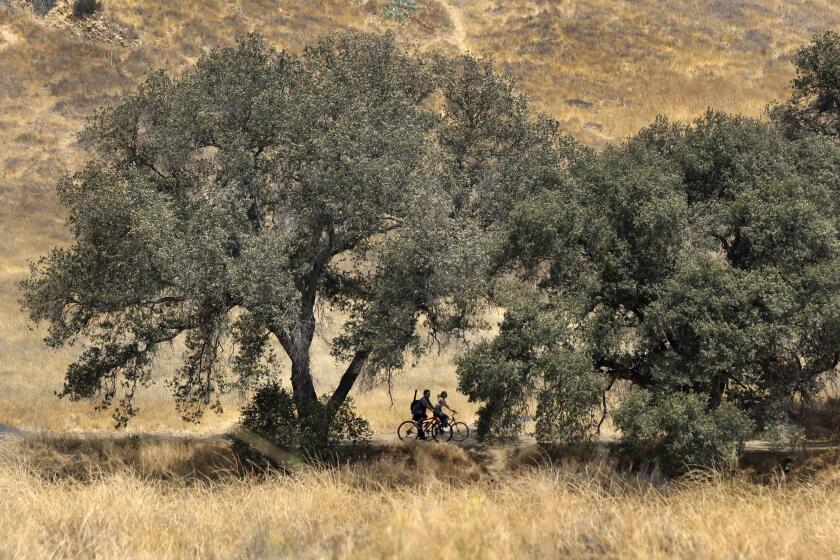What’s the California Supreme Court thinking? One justice gives us a clue

Cases the California Supreme Court declines to review may be as important as the court’s full-blown rulings, especially to the litigants. But little is known about why the court rejects certain appeals.
The justices vote on which cases to accept in a closed meeting held around a large, imposing table in the chief justice’s corner chambers in San Francisco. Their decisions are announced in brief orders, often no more than a paragraph. The orders give the case name and number, without any description, and do not reveal the court’s reasoning.
See the most-read stories this hour >>
For decades the process has been largely veiled in secrecy — until Gov. Jerry Brown appointed Justice Goodwin Liu to the seven-member court.
During the last several months, Liu, a former law professor, has written two lengthy dissents from the majority’s refusal to hear cases. The first, in October, protested the court’s vote against hearing a case in which a 10-year-old was deemed capable of waiving his right to remain silent.
The second came Friday. Liu protested that the court should have considered an appeal from two marijuana growers sentenced to life for a killing a jury found they did not personally commit.
“Because this case would enable us to provide useful guidance to the trial courts, and because defendants present a strong argument that they were convicted of second degree murder on a theory unsupported by sufficient evidence, I would grant review,” Liu wrote.
Lengthy dissents from orders denying review, while rare on the California Supreme Court, are not uncommon on the U.S. Supreme Court. Some U.S. Supreme Court dissents from such orders have become famous.
Justice Harry A. Blackmun’s 1994 condemnation of capital punishment — “From this day forward, I no longer shall tinker with the machinery of death” — came in a dissent from the court’s refusal to hear an appeal of a Texas inmate.
Liu and Brown’s other appointees have spent most of their careers enmeshed in federal, not state, law.
“Perhaps Justice Liu thinks that is a good practice to incorporate into the California Supreme Court,” said David S. Ettinger, an appellate lawyer who writes about the state court on his law firm’s blog, At the Lectern.
Dissents from such orders are not binding, and California law remains unclear about whether they can be cited in different cases, Ettinger said.
Liu’s October dissent on whether youngsters were capable of waiving their rights reads like a brief imploring the U.S. Supreme Court to take up the question, Ettinger said. In fact, lawyers for the juvenile cited Liu’s dissent in a petition to the high court to review the case, Ettinger said. That petition is still pending.
Santa Clara University law professor Gerald Uelmen views Liu’s dissents as evidence of “a power struggle” on the California court between Brown’s appointees and the Republican appointees.
Liu chose to write his dissent last week in a case that examined “the natural and probable consequences doctrine.” The legal theory says that someone can be convicted of a crime they did not personally commit or even foresee if a reasonable person should have known the crime was the likely result of his conduct.
The appeal was filed by Sidonio Cruz-Santos and Augustin Zepeda-Onofre, who worked on an illegal marijuana-growing operation in Northern California. They hosted a party one night for an employee and others. Two of the partygoers later argued, and one was shot and killed.
The prosecution argued that because the defendants armed themselves and others to protect the illegal crop, they bore responsibility for the killing.
Liu argued that the marijuana-growing operation had nothing to do with the killing. Workers were given guns to protect against wild animals and thieves, “not irritating guests,” Liu wrote.
The argument that apparently sparked the shooting dealt with whether the victim had told the other man’s wife that he had used cocaine. It had nothing to do with marijuana, Liu contended.
“Although it may be reasonably foreseeable that a grow operation worker who carries a gun will use it to protect the operation, it is not reasonably foreseeable that the worker will use the gun against a person who simply irritates the worker but poses no apparent threat to the operation,” Liu wrote.
The Brown appointee said the evidence failed to establish that the killing had anything to do with the grow operation, “much less that it was a reasonably foreseeable consequence” of the marijuana cultivation.
Brown’s other appointees, Justice Mariano-Florentino Cuellar and Leondra R. Kruger, did not sign Liu’s dissent. Kruger, who gave birth to a daughter on March 1, was absent. The order did not state how Cuellar voted on the case.
Chief Justice Tani Cantil-Sakauye, joined by three other justices, defended the majority’s decision, noting that that “reasonable minds may differ.” She stressed that a court decision to reject an appeal does not mean the justices supported the result in the case.
The court hears and decides only a fraction of the appeals it receives each year. The justices may disagree with a lower court ruling but decide the underlying legal issue should be resolved in a future case framed by a more compelling set of facts.
Or the justices may reject a case because they want the core legal issue to percolate further in the lower courts.
Or the court may disagree with the result but decide the legal issue at stake lacks statewide importance.
The court also can decertify lower court rulings, preventing them from being cited as precedent, without actually reviewing and overturning them. The appeals court that decided the marijuana growers’ case, though, had not certified its ruling. Decertification was not an option for the California Supreme Court.
Whatever Liu’s reasons, his dissent last week had a purpose. It was a sign to other lawyers that at least one justice was troubled by the application of “the natural and probable consequences doctrine.” It may also have been an invitation for defense lawyers to bring similar cases before the court.
And it provided notice to the public that the state’s highest court let stand two life sentences in a difficult case for reasons the justices did not have to explain.
Twitter: @mauradolan
ALSO
Plaschke: This is a big rookie mistake for D’Angelo Russell
Pregnant woman’s death spurs a safety debate about China’s street fences
Apple wants the FBI to reveal how it hacked the San Bernardino killer’s iPhone
More to Read
Start your day right
Sign up for Essential California for news, features and recommendations from the L.A. Times and beyond in your inbox six days a week.
You may occasionally receive promotional content from the Los Angeles Times.







